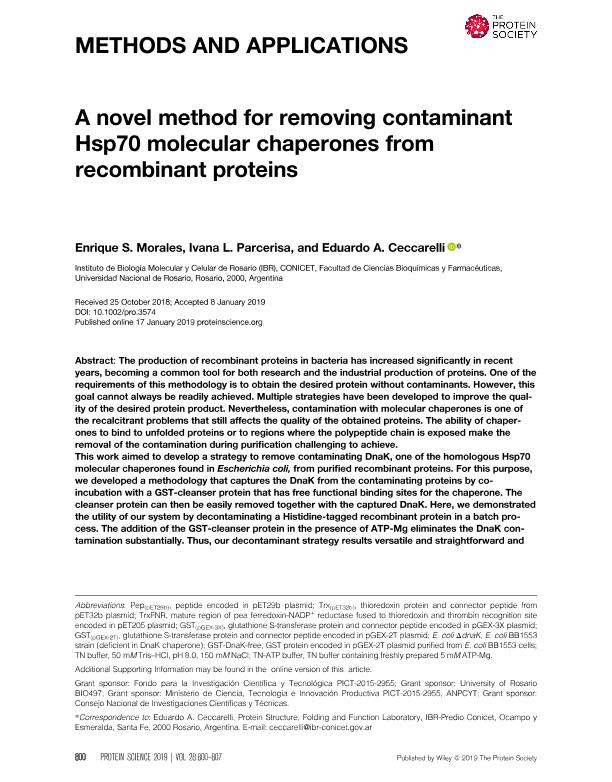Artículo
A novel method for removing contaminant Hsp70 molecular chaperones from recombinant proteins
Fecha de publicación:
04/2019
Editorial:
John Wiley & Sons
Revista:
Protein Science
ISSN:
0961-8368
Idioma:
Inglés
Tipo de recurso:
Artículo publicado
Clasificación temática:
Resumen
The production of recombinant proteins in bacteria has increased significantly in recent years, becoming a common tool for both research and the industrial production of proteins. One of the requirements of this methodology is to obtain the desired protein without contaminants. However, this goal cannot always be readily achieved. Multiple strategies have been developed to improve the quality of the desired protein product. Nevertheless, contamination with molecular chaperones is one of the recalcitrant problems that still affects the quality of the obtained proteins. The ability of chaperones to bind to unfolded proteins or to regions where the polypeptide chain is exposed make the removal of the contamination during purification challenging to achieve. This work aimed to develop a strategy to remove contaminating DnaK, one of the homologous Hsp70 molecular chaperones found in Escherichia coli, from purified recombinant proteins. For this purpose, we developed a methodology that captures the DnaK from the contaminating proteins by co-incubation with a GST-cleanser protein that has free functional binding sites for the chaperone. The cleanser protein can then be easily removed together with the captured DnaK. Here, we demonstrated the utility of our system by decontaminating a Histidine-tagged recombinant protein in a batch process. The addition of the GST-cleanser protein in the presence of ATP-Mg eliminates the DnaK contamination substantially. Thus, our decontaminant strategy results versatile and straightforward and can be applied to proteins obtained with different expression and purifications systems as well as to small samples or large volume preparations.
Archivos asociados
Licencia
Identificadores
Colecciones
Articulos(IBR)
Articulos de INST.DE BIOLOGIA MOLECULAR Y CELULAR DE ROSARIO
Articulos de INST.DE BIOLOGIA MOLECULAR Y CELULAR DE ROSARIO
Citación
Morales, Enrique Salvador; Parcerisa, Ivana Lorna; Ceccarelli, Eduardo Augusto; A novel method for removing contaminant Hsp70 molecular chaperones from recombinant proteins; John Wiley & Sons; Protein Science; 28; 4; 4-2019; 800-807
Compartir
Altmétricas




